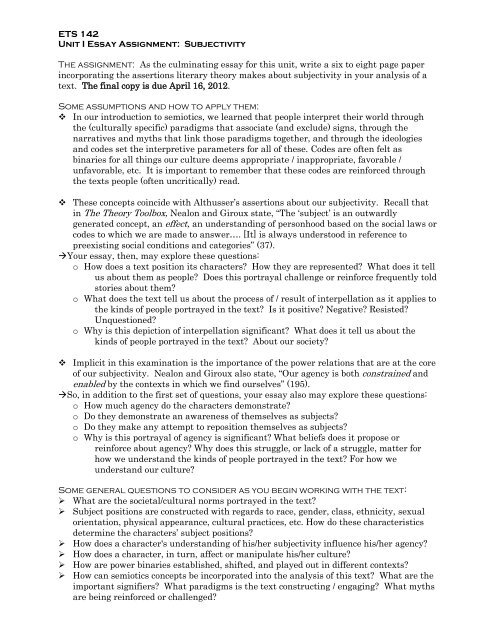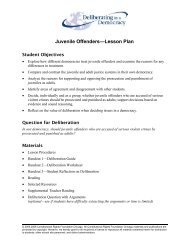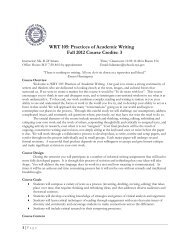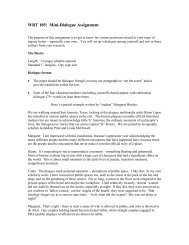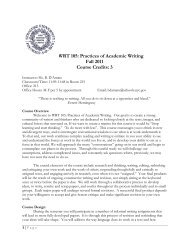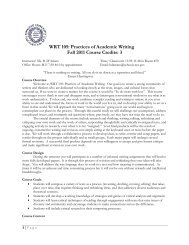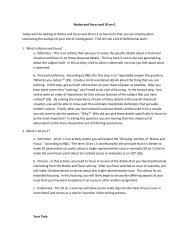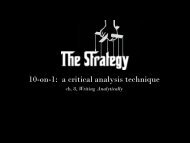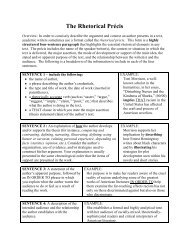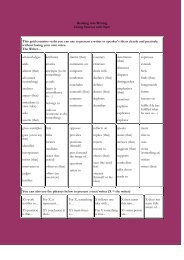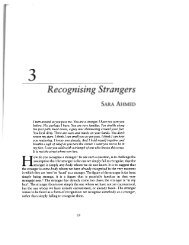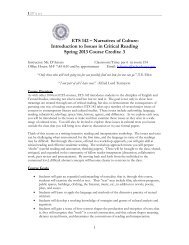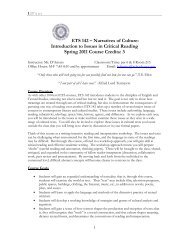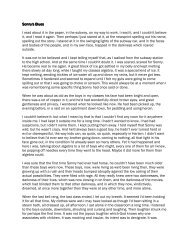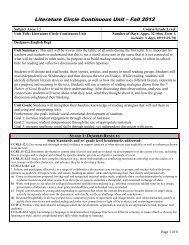Subjectivity Essay Prompt - Litstudies.org
Subjectivity Essay Prompt - Litstudies.org
Subjectivity Essay Prompt - Litstudies.org
Create successful ePaper yourself
Turn your PDF publications into a flip-book with our unique Google optimized e-Paper software.
ETS 142<br />
Unit I <strong>Essay</strong> Assignment: <strong>Subjectivity</strong><br />
The assignment: As the culminating essay for this unit, write a six to eight page paper<br />
incorporating the assertions literary theory makes about subjectivity in your analysis of a<br />
text. The final copy is due April 16, 2012.<br />
Some assumptions and how to apply them:<br />
In our introduction to semiotics, we learned that people interpret their world through<br />
the (culturally specific) paradigms that associate (and exclude) signs, through the<br />
narratives and myths that link those paradigms together, and through the ideologies<br />
and codes set the interpretive parameters for all of these. Codes are often felt as<br />
binaries for all things our culture deems appropriate / inappropriate, favorable /<br />
unfavorable, etc. It is important to remember that these codes are reinforced through<br />
the texts people (often uncritically) read.<br />
These concepts coincide with Althusser’s assertions about our subjectivity. Recall that<br />
in The Theory Toolbox, Nealon and Giroux state, “The ‘subject’ is an outwardly<br />
generated concept, an effect, an understanding of personhood based on the social laws or<br />
codes to which we are made to answer…. [It] is always understood in reference to<br />
preexisting social conditions and categories” (37).<br />
Your essay, then, may explore these questions:<br />
o How does a text position its characters? How they are represented? What does it tell<br />
us about them as people? Does this portrayal challenge or reinforce frequently told<br />
stories about them?<br />
o What does the text tell us about the process of / result of interpellation as it applies to<br />
the kinds of people portrayed in the text? Is it positive? Negative? Resisted?<br />
Unquestioned?<br />
o Why is this depiction of interpellation significant? What does it tell us about the<br />
kinds of people portrayed in the text? About our society?<br />
Implicit in this examination is the importance of the power relations that are at the core<br />
of our subjectivity. Nealon and Giroux also state, “Our agency is both constrained and<br />
enabled by the contexts in which we find ourselves” (195).<br />
So, in addition to the first set of questions, your essay also may explore these questions:<br />
o How much agency do the characters demonstrate?<br />
o Do they demonstrate an awareness of themselves as subjects?<br />
o Do they make any attempt to reposition themselves as subjects?<br />
o Why is this portrayal of agency is significant? What beliefs does it propose or<br />
reinforce about agency? Why does this struggle, or lack of a struggle, matter for<br />
how we understand the kinds of people portrayed in the text? For how we<br />
understand our culture?<br />
Some general questions to consider as you begin working with the text:<br />
What are the societal/cultural norms portrayed in the text?<br />
Subject positions are constructed with regards to race, gender, class, ethnicity, sexual<br />
orientation, physical appearance, cultural practices, etc. How do these characteristics<br />
determine the characters’ subject positions?<br />
How does a character's understanding of his/her subjectivity influence his/her agency?<br />
How does a character, in turn, affect or manipulate his/her culture?<br />
How are power binaries established, shifted, and played out in different contexts?<br />
How can semiotics concepts be incorporated into the analysis of this text? What are the<br />
important signifiers? What paradigms is the text constructing / engaging? What myths<br />
are being reinforced or challenged?
Ideas you should consider in order to add depth to your analysis:<br />
British sociologist and cultural theorist Stuart Hall, stressing the role the reader plays in<br />
determining a text’s meaning, has proposed three kinds of readings:<br />
Dominant (or, 'hegemonic') reading: the reader shares or is uncritical of the text's<br />
interpretive framework and, so, has the preferred reading of the text (i.e., the<br />
interpretation offered by the text’s producer);<br />
Negotiated reading: the reader partly shares the text's interpretive framework and<br />
largely accepts the preferred reading, but also disagrees at some points and, therefore,<br />
sometimes resists and modifies it in a way which reflects his/her own experiences;<br />
Oppositional ('counter-hegemonic') reading: the reader, whose social situation places<br />
him/her in a directly oppositional relation to the dominant code (interpretive<br />
framework), rejects the preferred reading, bringing to bear an alternative frame of<br />
reference.<br />
Consider how these ideas may complicate your reading of the text you’ve chosen:<br />
o Is there anything interesting / revealing / strange / problematic about the<br />
dominant reading, the reading you imagine the author(s) would like the readers<br />
to adopt?<br />
o Is there room for a negotiated or oppositional reading, one that would lead us to<br />
more critically examine the portrayal of the characters, their subjectivity, or the<br />
cultural climate in which the text was produced?<br />
As always…<br />
Be sure to use appropriate MLA documentation:<br />
For quotations from the text you are analyzing;<br />
When making direct reference to the concepts of critical theory;<br />
When using research to contextualize the object of your analysis in order to develop the<br />
significance of your claim.<br />
We will have limited editing time in class. It would probably be useful to edit outside of<br />
class as well.<br />
Suggested texts:<br />
Select a film and investigate these issues. Possibilities include: The Mill on the Floss;<br />
Pride and Prejudice; The Scarlet Letter; The Letter; Thelma and Louise; Save the Last<br />
Dance; Love and Basketball; Bring It On; Billy Elliot; Black Hawk Down; MASH;<br />
Monster's Ball; Shallow Hal; 8 Mile; Rabbit Proof Fence; Coming to America; Smoke<br />
Signals; Pretty Woman; Ma Vie en Rose; My Beautiful Laundrette; Bringing Down the<br />
House; Animal House; Malibu's Most Wanted; Bend It Like Beckham; Raiders of the<br />
Lost Ark; Nine to Five; Real Women Have Curves; The Man Who Would Be King;<br />
Harlan County, USA; Lost in Translation; The Station Agent; Chop Shop; The Wrestler;<br />
The Squid and the Whale; Brokeback Mountain; Crash; Anvil – The Story of Anvil.<br />
Revisit a novel, play or a short story you have already analyzed using a New Critical<br />
model and bring the above assumptions to bear on the text.


